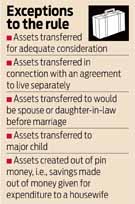An individual is generally taxed in respect of his own income. However, in certain cases, there could be a deviation from this principle where the individual is taxed for income which legally belongs to someone else. Also, considering the progressive rates of taxation applicable to individual taxpayers, at times, individuals in the higher tax bracket are tempted to reduce their liability by transferring their income or assets in such a way that the incidence of tax on the income or assets transferred falls on the transferee. To curb these practices, the Income Tax Act, 1961 has clubbing provisions where the income of the transferee is deemed as income of the individual in certain cases. Let’s look at four scenarios where clubbing provisions apply:

1 Rent on spouse’s name Shah, a top executive in a multinational firm, is concerned about the
2 Investing in spouse’s name another common method used to optimise taxes is to transfer assets to one’s relatives (spouse in particular). Suppose, Shah Gifts money to his spouse and she invests it in a fixed deposit. Here, the interest earned on such deposit would be included in Shah’s taxable income due to the provisions of clubbing of income. But, if Shah invests the money in listed equity shares and sells them (on a recognised stock exchange) after a year, then the capital gains on sale of such shares (being exempt) would not form part of his total income. It has to be reported under exempt income in Shah’s tax return.high taxes he pays on his personal income. To optimise his tax position, he transfers rental income from property to his wife’s account. Since Shah is the owner of the property, transfer of rental income to his wife’s name will attract clubbing provisions and he would be liable to pay tax on the same, even though the income is credited to his spouse’s account.
3 Round-tripping among family members even circuitous transfers are covered by clubbing provisions. For instance, if Shah gifts money to his mother-in-law, who gifts the same to her daughter, then the income earned from the money so gifted is liable to be clubbed in Shah’s hands. Similarly, if Singh, a businessman, pays salary from his proprietorship firm to his wife, then such salary would get clubbed in Singh’s hands. The law provides that if an individual has substantial interest (i.e., 20 per cent more voting rights or earnings) in any concern, then any form of remuneration to the spouse is liable to be included in the income of the individual, unless it can be proved that such remuneration paid is entirely from the exercise of professional and technical skills possessed by the spouse.
4 Minor reliefs an important aspect worth noting is that a minor’s income is to be clubbed with the parent whose total income is greater, excluding the minor’s income. However, if the parents are living separately, the minor’s income would be clubbed with the parent who maintains the child. The parent in whose income the minor’s income is clubbed is entitled to claim a maximum exemption of Rs. 1,500 per annum. Clubbing of income would not apply if the income of the minor is generated out of his manual work, skill, specialised knowledge and experience, or, where the child earning such income is one with special needs.
While the income earned out of assets transferred without adequate consideration is taxable in the transferor’s hand, subsequent investment out of accretions is liable to be included in the hands of the transferee and not the transferor













